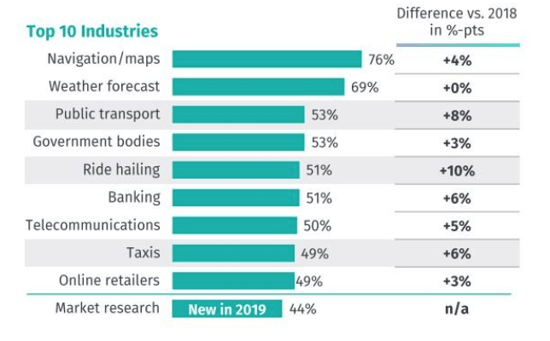 Consumers are conflicted about sharing their data. Concerns about how their information is handled — or mishandled — have three in five users reluctant to provide personal details. Yet, sharing location data is met with considerably less resistance1.
Consumers are conflicted about sharing their data. Concerns about how their information is handled — or mishandled — have three in five users reluctant to provide personal details. Yet, sharing location data is met with considerably less resistance1.
Globally, 70% of users are willing to share their location data at least sometimes, which is up two percentage points over the totals reported in 20181. The number jumps to 76% when users know their location data is being directly shared with industries that fall under Mobility as a Service (MaaS)1:

Source: HERE Marketing Intelligence, The Privacy Paradox Reloaded: Changes in Consumer Behavior and Attitudes since 2018, August 2019
Transparency
The year-over-year growth in MaaS consumer confidence isn’t arbitrary. Data collector transparency about how location data is gathered and used is of major significance to users. About 30% need to feel in control of that experience.
For location data, the benefits of sharing are so clear there is little hesitation among users:
- 75% feel it increases personal safety and security1
- 75% find it necessary to enable a service1
- 68% want additional useful and relevant information, such as accessing speed limit data1
- 65% understand it provides additional service functionality1
Trust
Transparency goes hand in hand with trust. If data collectors are proven to be trusted and reputable, 67% of users are “likely or very likely” to share their location data1. The same holds true for brand reputation — 64% of users will share if the brand soliciting location data is familiar and respected1.
While those percentages are impressive, they pale in comparison to the 79% of users across the world who are willing to share their location data specifically with navigation or mapping services/apps1. While partially attributable to need and convenience, the trust that users have in well-known, highly regarded data collectors such as HERE Location Services when making the decision cannot be underestimated.
Transparency and trust continue to grow between users and providers, as does an understanding of how location technology influences everyday life and game-changing innovations. Emerging Trends in Location Technology explores what’s new, now, and next. Click the button below for your copy of this handy reference guide.
SOURCE
*HERE Marketing Intelligence, The Privacy Paradox Reloaded: Changes in Consumer Behavior and Attitudes since 2018, August 2019
Subscribe to ADCi's Blog
Related Posts
IoT Asset Tracking Helps Companies Save Money in 3 Key Areas

HERE Transit: 4 Fundamentals That Are Changing Public Transportation

